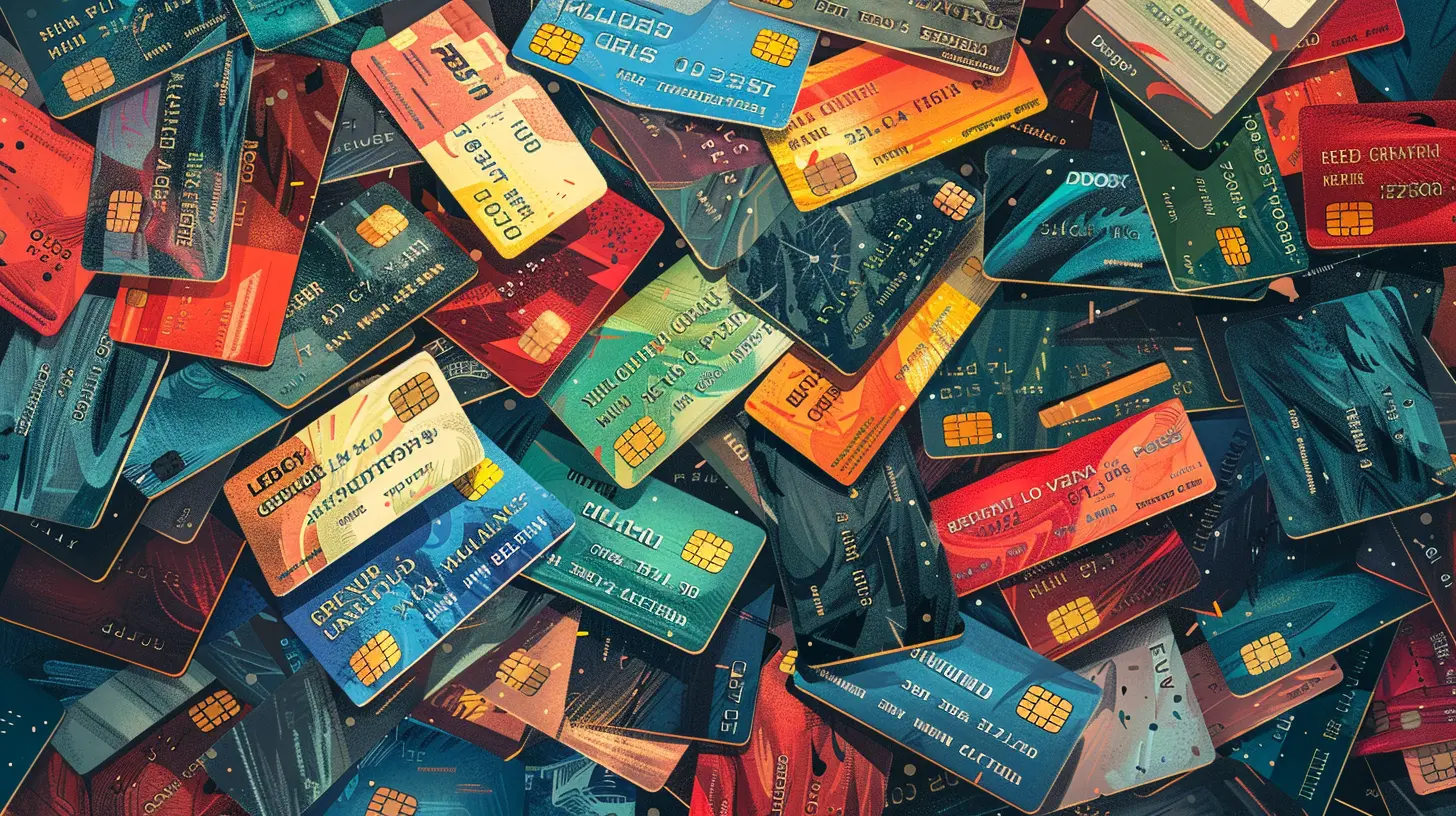Does Having Multiple Credit Cards Help or Hurt Your Credit?
27 November 2024
When it comes to credit cards, the age-old question is: "How many is too many?" Some people swear by carrying multiple cards in their wallets, while others prefer to keep things simple with just one. But the real question here is whether owning multiple credit cards helps or hurts your credit. The answer? Well, it depends.
Let’s break it down and tackle this topic in a way that’s easy to understand. By the end of this article, you’ll have a clear answer and know how to navigate the world of credit cards like a pro!
The Basics: How Credit Scores Work
Before we dive into the impact of multiple credit cards, let’s quickly revisit how credit scores work. Your credit score is essentially a three-digit number (ranging from 300 to 850) that reflects your creditworthiness. Think of it as your financial report card.Your credit score is determined by several key factors:
1. Payment History (35%) – Are you paying your bills on time? This is the most important factor.
2. Credit Utilization (30%) – The amount of credit you’re using versus your total credit limit.
3. Credit History Length (15%) – How long you’ve had your credit accounts open.
4. Credit Mix (10%) – Having a variety of credit types (e.g., credit cards, loans).
5. New Credit (10%) – How often you apply for credit.
Now that we’ve covered the basics, let’s explore how having multiple credit cards plays into these factors.
The Good: How Multiple Credit Cards Can Help Your Credit
1. Lower Your Credit Utilization Ratio
One of the biggest perks of having multiple credit cards is the potential to lower your credit utilization ratio. What’s that, you ask? It’s the percentage of your available credit that you’re actually using.For example, if you have one credit card with a $5,000 limit and you’re carrying a $2,500 balance, your utilization is at 50%. That’s pretty high, and it could ding your score. But let’s say you have three credit cards, each with a $5,000 limit (totaling $15,000). If you’re still carrying that same $2,500 balance, your utilization drops to around 16%. That’s much better in the eyes of credit bureaus!
A good rule of thumb? Keep your credit utilization under 30%—and if possible, aim for under 10%.
2. Build a Longer Credit History
When you have multiple credit cards, especially if you keep them open for years, you can build a longer and healthier credit history. The average age of your credit accounts is an important factor in determining your credit score.However, here’s a pro tip: Don’t close old credit cards, even if you don’t use them often. Closing accounts can shorten your credit history and potentially hurt your score.
3. Gain Rewards and Benefits
While this doesn’t directly impact your credit score, having multiple credit cards can give you access to different rewards and benefits. Maybe one card offers cash-back rewards for groceries, and another is perfect for travel perks. Using the right card for the right purchase can maximize your benefits without hurting your credit—if done responsibly.
The Bad: How Multiple Credit Cards Can Hurt Your Credit
1. Temptation to Overspend
Let’s be honest: With more credit cards in your wallet, it’s easy to feel like you have unlimited money. But here’s the kicker—you’ll eventually have to pay it back, and interest rates on credit cards are no joke.If you’re not disciplined, having multiple cards can lead to overspending, which can hurt your financial stability and your credit. Remember, credit cards are tools, not free money!
2. Hard Inquiries on Your Credit Report
Every time you apply for a new credit card, the issuer will perform a hard inquiry on your credit report. A hard inquiry can temporarily lower your credit score by a few points. If you’re applying for multiple cards in a short span of time (say, within a couple of months), these inquiries can add up and make lenders think you’re desperate for credit. That’s a red flag.3. Managing Payments Can Be Overwhelming
Having one credit card is pretty simple: Pay your bill on time, and you’re good to go. But juggling multiple cards? That can get tricky. Missing even a single payment can tank your credit score because your payment history carries the most weight in your credit score calculation.If you’re not great at keeping track of payment due dates, multiple credit cards could become a headache.
The Ugly: When Multiple Credit Cards Spiral Out of Control
Let’s take it a step further. What happens if you max out all your credit cards and can’t keep up with your payments? This is when having multiple credit cards can spiral out of control and cause long-term damage to your credit.High balances, missed payments, and defaulting on accounts can send your credit score plummeting. And to make matters worse, lenders might label you as a high-risk borrower, making it harder to get approved for loans in the future.
So, What’s the Verdict?
Does having multiple credit cards help or hurt your credit? The answer depends on how you manage them. Here’s a quick checklist to help you figure out if having multiple credit cards is right for you:- Do you pay your bills on time? Late payments are a no-go.
- Can you keep your utilization ratio low? If you’re maxing out your cards, they’re doing more harm than good.
- Are you disciplined with spending? If you tend to overspend, stick to one or two cards.
- Can you manage multiple due dates? If not, consider setting up autopay or sticking to fewer cards.
If you’re financially responsible and keep track of your spending, having multiple credit cards can actually help your credit by lowering utilization and building a strong credit history. But if you’re prone to overspending or struggle to make timely payments, it’s best to keep things simple.
Tips for Managing Multiple Credit Cards
To make the most of your credit cards without hurting your score, follow these tips:1. Track Your Spending – Use budgeting apps or spreadsheets to stay on top of your purchases.
2. Set Up Autopay – Never miss a payment by automating them.
3. Stagger Application Timing – Avoid applying for multiple cards within a short period.
4. Stick to What You Can Handle – Don’t open more cards than you can manage effectively.
5. Pay in Full Each Month – Avoid carrying balances whenever possible to save on interest and boost your financial health.
Final Thoughts
Credit cards can be a powerful financial tool when used correctly, but they can also be a double-edged sword. Having multiple credit cards isn’t inherently bad, but the way you manage them determines whether they help or hurt your credit.The key is balance—pun intended. Treat your credit cards like tools in a toolbox. Use them wisely, and they’ll work in your favor. Neglect them, and they can create a financial mess. So, take control, stay organized, and make informed decisions about your credit. Your future self will thank you.
all images in this post were generated using AI tools
Category:
Credit ScoreAuthor:

Zavier Larsen
Discussion
rate this article
16 comments
Sari McIntire
Great insights! Balancing multiple cards can enhance credit utilization if managed responsibly.
April 5, 2025 at 11:40 AM

Zavier Larsen
Thank you! Yes, responsible management of multiple credit cards can indeed help improve credit utilization and overall credit health.
Kristen Bass
Having multiple credit cards is like juggling flaming swords – thrilling but risky! On one hand, you can show off your spending prowess; on the other, you might end up with a credit score that resembles a rollercoaster ride. Choose wisely, or embrace the chaos!
March 25, 2025 at 1:13 PM

Zavier Larsen
Great analogy! Balancing multiple credit cards can boost your credit score if managed wisely, but it definitely carries risks. Choose wisely!
Sablethorn McQuillen
Having multiple credit cards can enhance your credit score by improving your credit utilization ratio, but it requires diligent management to avoid debt.
January 26, 2025 at 11:26 AM

Zavier Larsen
Absolutely! Multiple credit cards can boost your credit score by lowering your utilization ratio, but responsible management is key to avoid potential debt.
Mateo Newton
This article provides valuable insights into the complexities of managing multiple credit cards. While having several can improve your credit utilization ratio, it can also lead to overspending and missed payments. It's crucial to find a balance and prioritize responsible financial habits to truly benefit your credit score.
January 21, 2025 at 12:48 PM

Zavier Larsen
Thank you for your thoughtful comment! You're absolutely right—responsible management is key to maximizing the benefits of multiple credit cards while minimizing risks.
Kassandra McElhinney
Mastering multiple credit cards can be a powerful tool for your financial success! Use them wisely to build credit and increase your financial flexibility. Embrace the challenge!
January 17, 2025 at 7:47 PM

Zavier Larsen
Thank you for your insight! When managed wisely, multiple credit cards can indeed enhance your credit score and financial flexibility. However, it's essential to monitor usage and payments carefully to avoid potential pitfalls.
Celine Warner
Balance wisely, thrive financially!
January 14, 2025 at 12:35 PM

Zavier Larsen
Absolutely! Balancing multiple credit cards can enhance your credit score if managed wisely, but mismanagement can lead to pitfalls. Keep usage low and payments timely to thrive financially!
Quentin Harmon
Great insights! Balancing multiple credit cards can be tricky, but with responsible management, they can enhance your credit score. Stay disciplined!
January 11, 2025 at 7:26 PM

Zavier Larsen
Thank you! Absolutely, responsible management of multiple credit cards can positively impact your credit score. Staying disciplined is key!
Morrow Hudson
Multiple cards? It's like juggling! Handle with care, and your credit score might just applaud!
January 4, 2025 at 4:03 AM

Zavier Larsen
Absolutely! Managing multiple cards wisely can enhance your credit score, but it's crucial to stay organized and responsible.
Angie Pratt
Multiple credit cards can be a double-edged sword: responsibly managed, they boost your score; mismanaged, they plunge you into debt—choose wisely!
December 30, 2024 at 11:36 AM

Zavier Larsen
Thank you for highlighting the importance of responsible management! Balance is key when it comes to using multiple credit cards effectively.
Peyton Middleton
Balance is key for credit health.
December 26, 2024 at 7:33 PM

Zavier Larsen
Absolutely! Maintaining a balance across multiple credit cards can improve your credit utilization ratio, which is crucial for good credit health.
Ford Marks
Great article! It's so interesting to see how multiple credit cards can impact our credit scores. Understanding the balance between benefits and risks is key to smart financial management. Keep up the insightful work!
December 18, 2024 at 9:03 PM

Zavier Larsen
Thank you for your kind words! I'm glad you found the article insightful. Balancing benefits and risks is indeed crucial for managing credit wisely.
Taryn Mahoney
Having multiple credit cards is like juggling flaming swords—risky but thrilling! If you can manage your balances and payments, it’s a credit score boost. But drop the ball, and you’ll singe your finances. Choose wisely and strut your credit game!
December 16, 2024 at 9:20 PM

Zavier Larsen
Great analogy! Properly managing multiple credit cards can definitely enhance your credit score, but it’s crucial to stay disciplined to avoid negative consequences. Choose wisely!
London Marks
This article is a fabulous read! It’s so helpful to understand how multiple credit cards can impact your credit score. With the right management, they can be an asset! Thanks for shedding light on this important topic! 🌟💳
December 5, 2024 at 7:25 PM

Zavier Larsen
Thank you for your kind words! I'm glad you found the article helpful. Proper credit card management can indeed make a significant difference in your credit score! 🌟
Yvonne Ellison
Having multiple credit cards is like attending a buffet: too many options can lead to a stomachache! Balance is key—too much swiping and you might end up credit card heavy, but just the right amount can leave you feeling financially fabulous!
December 2, 2024 at 9:10 PM

Zavier Larsen
Great analogy! Finding the right balance with credit cards can indeed enhance your credit score while avoiding pitfalls. Moderation is essential!
Heather Reyes
Having multiple credit cards can both help and hurt your credit score. While they can enhance your credit utilization ratio and payment history, excessive applications or high balances can negatively impact your score. It's essential to manage them wisely and maintain low balances for optimal credit health.
December 1, 2024 at 7:46 PM

Zavier Larsen
That's a great summary! Balancing credit card usage is key—responsibly managing multiple cards can improve your credit score, but overextending can lead to negative impacts.
Kate Sullivan
Balance usage wisely; it can enhance your score.
November 30, 2024 at 6:01 AM

Zavier Larsen
Thank you! Absolutely, using multiple credit cards wisely can improve your credit score by maintaining a low credit utilization ratio.
MORE POSTS

The Art of IPO Marketing: Building Hype and Managing Expectations

How to Effectively Track Business Expenses Without Getting Overwhelmed

How Interest Rates Differ Across Countries: A Global Perspective

Should You Incorporate Asset Protection into Your Retirement Planning?

How to Build a Financial Cushion for Your Business

Avoiding Cash Flow Problems When Scaling Your Business

How Interest Rates Influence Credit Card APR and Finance Charges

How to Protect Yourself from Identity Theft and Financial Fraud

Building a Budget That Works for You

The Role of Cash Flow Statements for Investors and Stakeholders